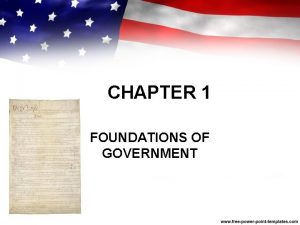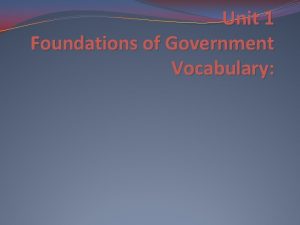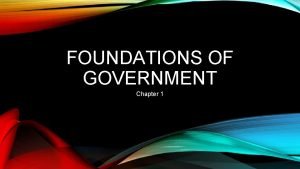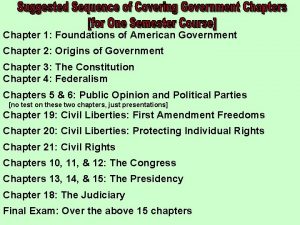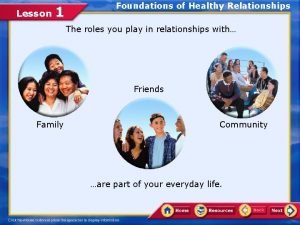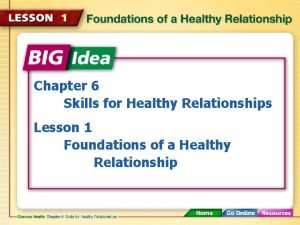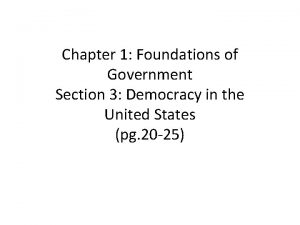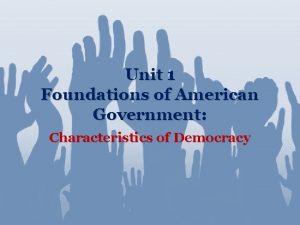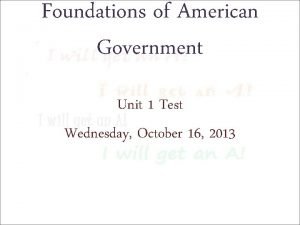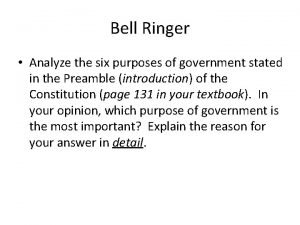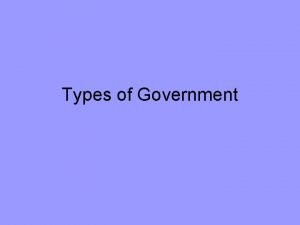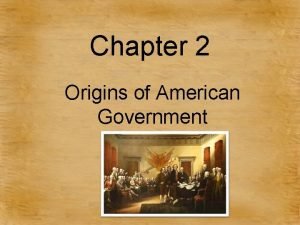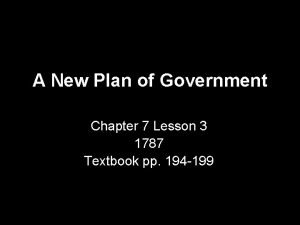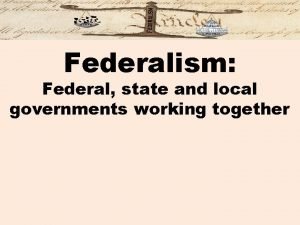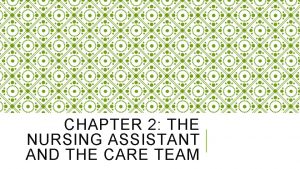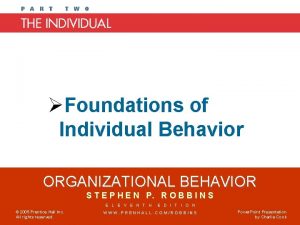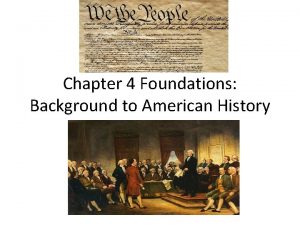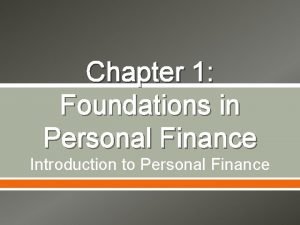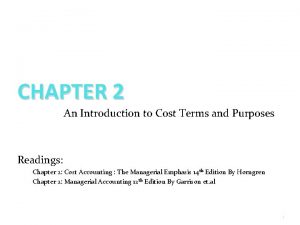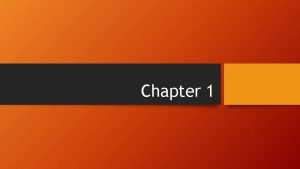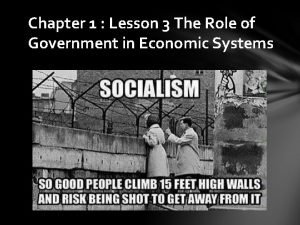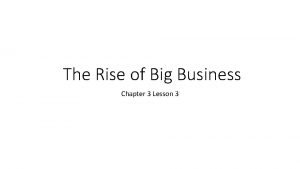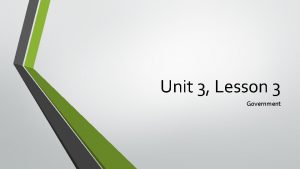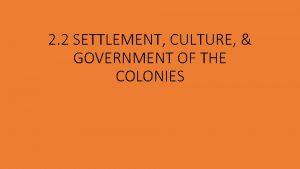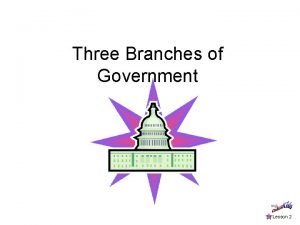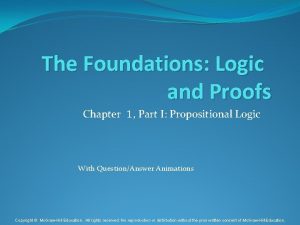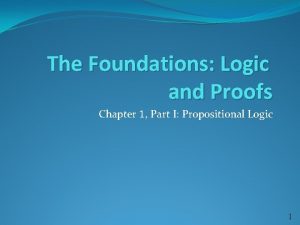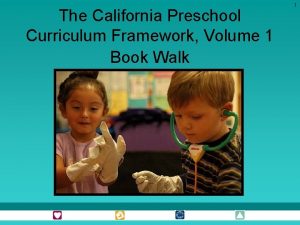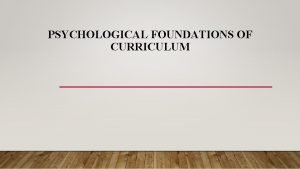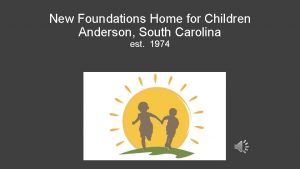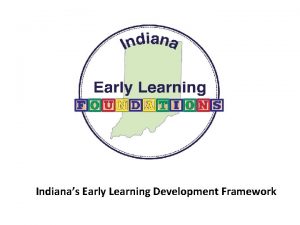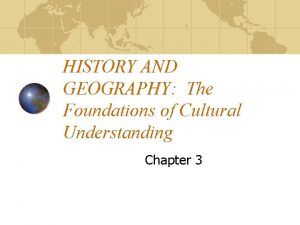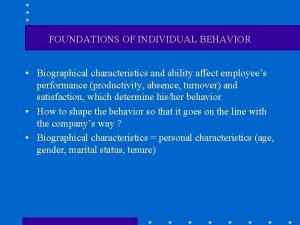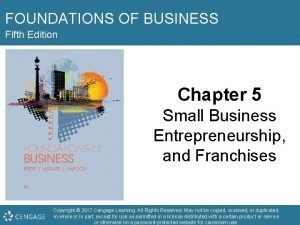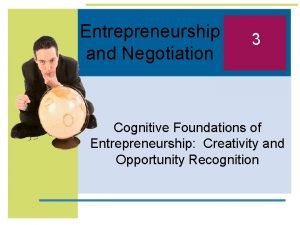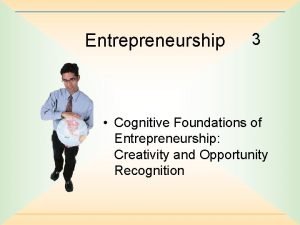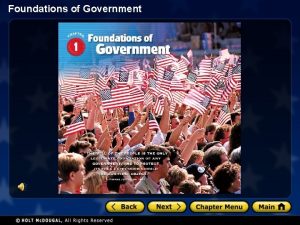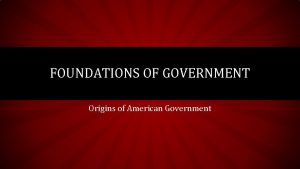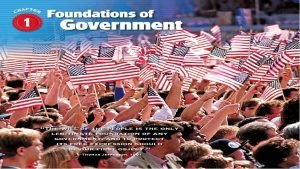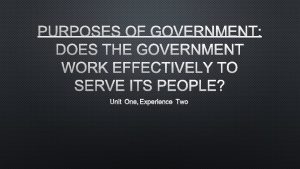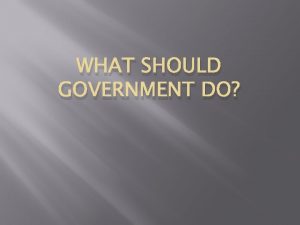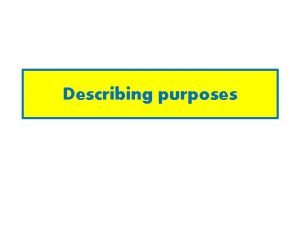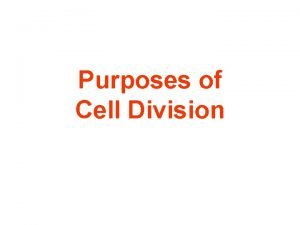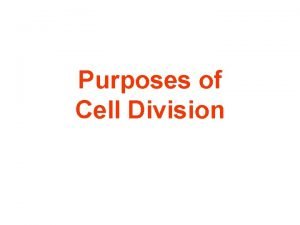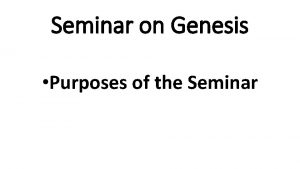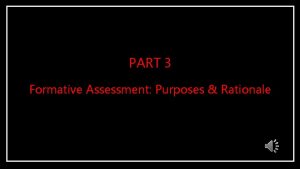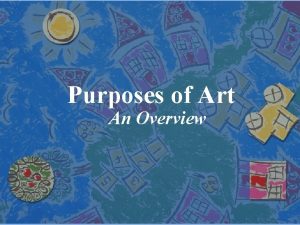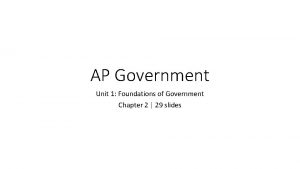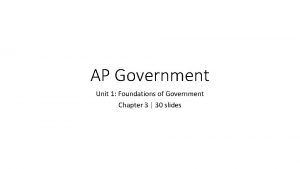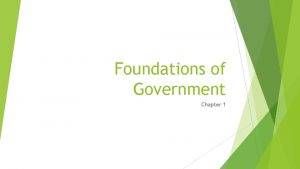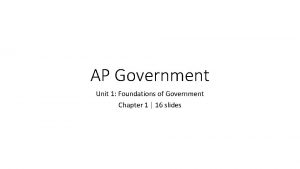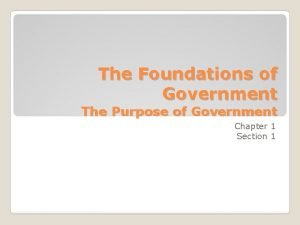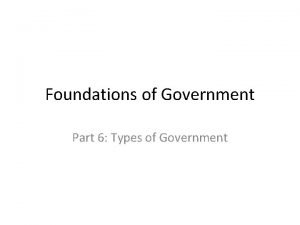CHAPTER 1 FOUNDATIONS OF GOVERNMENT LESSON 1 Purposes




































- Slides: 36

CHAPTER 1 FOUNDATIONS OF GOVERNMENT

LESSON 1: Purposes and Origins of Government • Essential Question: What are the purposes of government?

“Government is not the solution to our problems. Government is the problem. ” Ronald Reagan • Do you agree with this? • Why do many Americans dislike the government? • Could society exist without government?

What is Government and Anarchy? • Anarchy is a state without government and laws • Government is an institution through which leaders exercise power to make and enforce laws affecting the people under its control.

Functions of Government • . 1) Providing Leadership 2) Maintaining Order 3) Providing Public Services 4) Providing National Security 5) Providing Economic Security and Economic Assistance

Nation, State, and Country • Nation – Sizeable group of people who believe themselves united by common bonds of race, language, custom, or religion. • Example: Kurds in Iraq (do not have their own country) • State – from Greek philosopher Aristotle – A political community that occupies a definite territory and has an organized government (also a country) • Example: The United States of America • Sovereignty – Supreme and absolute authority within territorial boundaries

Characteristics of a State What makes the United States (or any other country) “one nation? ” • • Population Territory Government Sovereignty

Essential Features of a State

Make a Chart Theory Explanation

Origins of the State The Force Theory • The force theory states that one person or a small group took control of an area and forced all within it to submit to that person’s or group’s rule. The Evolutionary Theory • The evolutionary theory argues that the state evolved naturally out of the early family. (Father Abraham)

Origins of the State The Divine Right Theory • The theory of divine right holds that God created the state and that God gives those of royal birth a “divine right” to rule. The Social Contract Theory • The social contract theory argues that the state arose out of a voluntary act of free people.

Comparing Thomas Hobbes and John Locke - Social Contract Theory • Thomas Hobbes and John Locke both believed that people surrendered to the state the power needed to maintain order, but Locke believed that people had the right to break that contract when government failed to preserve the rights of people. Hobbes did not believe that right

Chapter 1 – Lesson 1 -Copy & Answer the questions from the handout

LESSON 2: Types of Government • Essential Question: What principles guide different types of government?

Systems of Governments • UNITARY SYSTEM – Gives all key powers to the central government • Examples: Japan, France, and Bolivia • CONFEDERATE SYSTEM – A loose union of independent and sovereign states • Example: early United States; Confederate States of America during Civil War

Systems of Governments • FEDERAL SYSTEM – Divides the powers of government between the national and state or provincial government. – Advantage: How it shares power among different levels while still having more centralized power – Disadvantage: Each level of government can make its own laws – The United States has Federal System!!!!


Constitutional Governments • A constitution is a plan that provides the rules for government. – Sets out ideals that the people bound by the constitution believe in and share – Establishes the basic structure of government and defines the government’s powers and duties – Provides the supreme law for the country • May be written or unwritten – United States has the oldest written constitution (1787)

Constitutional Government • A government in which a constitution has authority to place clearly recognized limits on the powers of those who govern. • LIMITED Governments

Types of Governments • WHO GOVERNS? – Autocracy: single ruler (power by force or inheritance) • Absolute/totalitarian dictatorship: tries to control all aspects of life (Hitler’s Germany) • Another form of Autocracy is Monarchy • King, Queen or Emperor – exercise supreme powers of government • Absolute Monarchy – complete and unlimited power to rule their people. • King of Saudi Arabia (rare now – common in the 1400 -1700’s) • Constitutional Monarchs – share governmental powers with elected legislatures or just ceremonial leaders

Types of Governments • WHO GOVERNS? – Oligarchy: small group (power by wealth, force, social position, religion) • Communist countries (China, North Korea) – Democracy: Any system of government in which rule is by the people. • Direct: people actually vote on issues • Representative: people elect reps to decide issues – Key idea is people hold sovereign power. – “Gov’t of the people, by the people, and for the people” Abraham Lincoln


Principles of Democracy • Citizen Participation • Regular Free & Fair Elections • Accepting the Results of Elections • The Rule of Law • Majority Rule with Minority Rights • Accountability • Transparency • Limited Government and Bill of Rights • Control of the Abuse of Power • Economic Freedom • Equality • Individual or Human Rights • Independent Judiciary • Competing Political Parties

As a society, what can we do to encourage more people to participate in politics and government?

Chapter 1, lesson 2 questions • Copy and answer questions and chart from handout

LESSON 3: The Role of Government in Economic Systems • Essential Question: What is the role of government in different types of economic systems?

Fundamentals of Economics • Economics is the study of how people and nations use their limited resources to attempt to satisfy wants and needs. • In every society, governments guide economies. • Factors of Production: – Producers, Distributors, Consumers, Labor, Resources, Capital, Entrepreneurs

Capitalism • 5 Main Characteristics – Private ownership and control of property and economic resources – Free Enterprise – Competition among businesses – Freedom of Choice – The possibility of Profits

Origins of Capitalism • Gradually developed • People can work for economic gain • Wealth should be used aggressively • Free Market – buyers and sellers are free to make unlimited economic decisions in the marketplace Competition – plays a key role. Laissez faire – to let alone. Government should keep hands off the economy.

Mixed Market Economies • Free enterprise combined with support by government agencies in the marketplace. – This is what the American Economy is. – Rooted deeply in idea of individual initiative – Respects right of all persons to own private property – Recognizes freedom to make economics choices is part of the freedom of political choice.

Socialism • The government owns the basic means of production, determines the use of their sources, distributes products and provides services. • 3 Goals – Distribution of wealth equally among people – Society’s control through its gov’t, of all major decisions about production – Public ownership of most land, factories, and other means of production

Democratic Socialism • The Socialists who believed in peaceful changes wanted to work with in the democratic political system to improve economic conditions. • Government owns basic means of production and makes most democratic decisions – Tanzania, Denmark, Norway & Sweden

Communism • Economic system. • Believes in collective (group) ownership and a planned economy. • The theory is that everybody pools their resources and labor to evenly distribute everything. • Karl Marx is “the” communist: . published his ideas in a pamphlet – “The Communist Manifesto”


• Take out a sheet of paper What would the country be like without a government? • Choose one of the following methods to answer the question…. • Write a summary • Brainstorm a list • Draw a picture

Chapter 1, lesson 3 • Define the key terms on page 22 • -Complete Guided Reading Activity
 Guided reading activity foundations of government lesson 2
Guided reading activity foundations of government lesson 2 Ultimate frisbee vocabulary
Ultimate frisbee vocabulary Chapter 1: foundations of government pdf
Chapter 1: foundations of government pdf Foundations of government (chapter 1 test form a)
Foundations of government (chapter 1 test form a) Foundations of a healthy relationship
Foundations of a healthy relationship Chapter 6 skills for healthy relationships
Chapter 6 skills for healthy relationships Foundations of government section 3
Foundations of government section 3 Unit 1 foundations of american government
Unit 1 foundations of american government Foundations of american government unit test
Foundations of american government unit test What are the six purposes of government
What are the six purposes of government The purposes of government
The purposes of government The constitution lesson 2 the three branches of government
The constitution lesson 2 the three branches of government Origins of american government chapter 2
Origins of american government chapter 2 Chapter 7 lesson 3 a new plan of government
Chapter 7 lesson 3 a new plan of government National government vs federal government
National government vs federal government Chapter 2 the nursing assistant and the care team
Chapter 2 the nursing assistant and the care team Foundations of individual behavior
Foundations of individual behavior Chapter 4 foundations background to american history
Chapter 4 foundations background to american history Foundations in personal finance chapter 1 test
Foundations in personal finance chapter 1 test An introduction to cost terms and purposes
An introduction to cost terms and purposes What is an overall state of well-being or total health
What is an overall state of well-being or total health Lesson 3 the role of government in economic systems
Lesson 3 the role of government in economic systems Big business lesson 3
Big business lesson 3 Unit 3 lesson 3
Unit 3 lesson 3 Lesson 2 settlement culture and government of the colonies
Lesson 2 settlement culture and government of the colonies Lesson 2 the three branches of government
Lesson 2 the three branches of government The foundations logic and proofs
The foundations logic and proofs The foundations logic and proofs
The foundations logic and proofs California preschool curriculum framework volume 1
California preschool curriculum framework volume 1 Psychological foundations of curriculum
Psychological foundations of curriculum New foundations home for children
New foundations home for children Indiana learning foundations
Indiana learning foundations History and geography the foundations of culture
History and geography the foundations of culture Foundations of individual behaviour
Foundations of individual behaviour Foundations of business 5th edition
Foundations of business 5th edition Cognitive foundations of entrepreneurship
Cognitive foundations of entrepreneurship Cognitive foundations of entrepreneurship
Cognitive foundations of entrepreneurship
